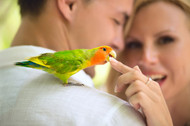Buying Birds and Parrots
Posted by Buying Birds and Parrots, buying Parrots, Buying Birds and Parrots uk, African Grey Parrot, how much is a Parrot, how much is a baby African Grey Parrot, how much are African Grey Parrots, on 9/1/2024
Sunday 2nd October 2016 was a big day in the world of Parrots.
If you weren?t aware, there was a CITES (Convention of International Trade in Endangered Species of Wild Fauna and Flora) vote to move the African Grey Parrot (both Congo and Timneh) ? the most popular pet Parrot kept in the UK, from Appendix II to Appendix I.
Countries
This motion was backed by the EU, North America and many West African countries. This means the international trade of wild caught African Grey Parrots is banned; which was done to provide one of the world?s most trafficked birds with the protection it needs.
According to Birdlife and The Guardian newspaper, up to three million African Grey Parrots have been taken from forests in west and central Africa in the last four decades. Sadly though, the vast majority of these birds don?t survive the journey.
DEFRA, the UK CITES management authority has changed the rules so that those without closed rings would need to be micro-chipped and the application should be accompanied by a hatch certificate or some other document from the breeder to confirm that the parrot was captive bred and not taken from the wild.No doubt that this will mean changes if you are breeding and selling African Greys and their chicks. (Source: John Hayward via ExoticDirect.)

If you already own a bird this won?t impact you.
Ringing
Ringing birds and Parrots is a fairly common practice.
There has been a ban on imported wild birds in the UK since the mid 1990?s. This saw an initial negative impact, as many species became harder to source, and prices increased.
As times passed, networks of breeders have been able to grow and many popular bird species once sold as popular pets are again more readily available and at more reasonable prices.
What can you do to ensure you?re buying healthy birds from ethical breeders? There are many ethical breeders out there.
Society
The Parrot Society UK is a good place to start your search, as they have a list of approved breeders on their website. Plus, there are plenty of online forums on which hobbyist breeders advertise.
Some pet birds and Parrots are protected by CITES, and require special documentation in order for them and their chicks to be sold. The DEFRA website has lots of information on this if you need further advice.
You obviously want to ensure you buy birds that are fit and healthy. Signs to look for in a healthy bird include; feathers tight against their body, shiny eyes and plumage and good feather condition.
Signs a bird is unhealthy include; difficulty breathing, sneezing, discharge from the eyes or nose, wheezing, fluffed up feathers, missing feathers (feather plucked), seeming lethargic, underweight (breast bone is prominent) and deformities to beak, feet or feathers.
Freedoms
Providing the five freedoms is a great way to ensure birds remain happy and healthy once you bring them home.
? Freedom from thirst and hunger, so providing a nutritious diet and access to clean water.
? Freedom to express normal inherent behaviour, providing a suitably sized cage with a variety of perches and materials or toys that offer physical and mental stimulation.
? Freedom from pain, injury, disease and environmental impoverishment, ensuring any illness are looked at and cared for appropriately.
? Freedom from discomfort, includes ensuring the air is free from smoke, air fresheners, perfumed candles and other harmful chemicals.
? Freedom from fear and distress, so not allowing birds to be over housed, provided out-of-cage time, kept a safe distance from predators.
Once you?ve bought your Parrot, find everything you need for them



